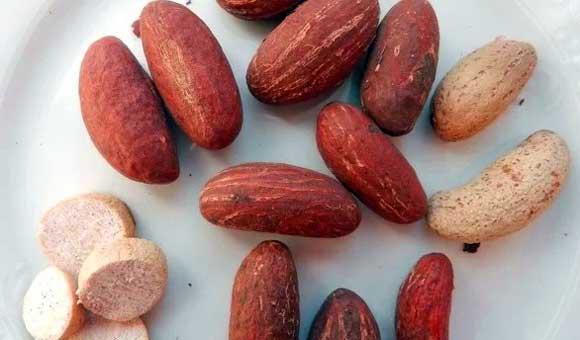Garcinia kola, commonly known as bitter kola, is a plant native to Central and Western Africa, and it has long been valued for its medicinal properties.This nut, characterized by its distinctly bitter taste, is more than just a traditional snack; it is a reservoir of bioactive compounds that contribute to a range of potential health benefits. From its historical use in traditional medicine to emerging scientific investigations, bitter kola is gaining recognition for its therapeutic potential. This article explores the multifaceted health benefits associated with the consumption of bitter kola, examining both traditional applications and contemporary research findings.
Nutritional Profile and Bioactive Compounds
While comprehensive nutritional data on bitter kola remains an area of ongoing research, preliminary studies have identified a noteworthy profile of nutrients and bioactive compounds. Research indicates that bitter kola contains:
- Macronutrients:Significant amounts of carbohydrates, fats, and proteins, contributing to its potential energy-providing properties.
- Vitamins and Minerals:Notable levels of Vitamin C, calcium, potassium, and iron, essential micronutrients for various physiological functions.
- Bioactive Phytochemicals:Bitter kola is rich in phytochemicals, non-nutritive plant compounds known for their protective properties. These include:
- Antioxidants:Flavonoids and other compounds exhibiting antioxidant activity, which help combat oxidative stress by neutralizing free radicals in the body.
- Antimicrobial Agents:Substances with antibacterial and antiviral properties, potentially contributing to its use in traditional medicine for infections.
- Anti-inflammatory Compounds:Components that may help modulate inflammatory responses in the body.
- Kolaviron: A chemical compound found in bitter kola, showing promising effects in early studies, particularly related to blood sugar management.
- Saponins, Tannins, Alkaloids, and Cardiac Glycosides:Various phytochemicals contributing to the plant's potential medicinal properties.
Traditional and Emerging Health Benefits
Bitter kola has a long history of use in traditional African medicine. Modern research is beginning to explore and, in some cases, validate these traditional applications, along with uncovering new potential benefits:
- Management of Infections:Traditionally, bitter kola has been used to combat a wide range of infections, from common colds to hepatitis.Studies have indicated its potential to fight bacterial and viral infections, supporting its traditional use for coughs and related symptoms.Research suggests that bitter kola may possess antimicrobial properties that contribute to these effects.
- Anti-inflammatory Properties:In African traditional medicine, bitter kola seeds are commonly chewed to alleviate inflammatory conditions like arthritis.Scientific studies have explored its effects on inflammation markers, suggesting that bitter kola may have anti-inflammatory properties comparable to some conventional medications.This has been investigated in the context of conditions like osteoarthritis and low back pain, with some studies indicating a reduction in inflammation markers.
- Potential Anti-diabetic Effects:Early research, primarily in animal models, suggests that compounds like kolaviron found in bitter kola may have a protective effect against hypoglycaemia and may help manage blood glucose levels in type 2 diabetes.Studies on diabetic rats have shown that bitter kola extracts can lower fasting blood glucose and improve lipid profiles, although human studies are needed to confirm these findings.
- Cardiovascular Health:Research has highlighted the potential of bitter kola extracts, particularly saponins, to improve lipid profiles, reducing total cholesterol, LDL cholesterol, and triglycerides while increasing HDL cholesterol in animal models.These findings suggest a potential cardioprotective role for bitter kola and its possible use in managing hyperlipidaemia and associated cardiovascular risks.
- Antioxidant Activity:Bitter kola has been shown to enhance antioxidant activities within the body. Studies using animal models have demonstrated that bitter kola extracts can increase the activity of antioxidant enzymes like superoxide dismutase (SOD) and catalase (CAT), which are crucial for defending against oxidative stress. This effect appears to be dose and duration-dependent, suggesting that regular consumption might bolster the body's antioxidant defences.
- Liver Protection (Hepatoprotective Effects):Research using animal models indicates that bitter kola may possess hepatoprotective properties, potentially shielding the liver from damage caused by toxic substances.Studies have shown that bitter kola can mitigate liver damage induced by agents like carbon tetrachloride and mercury, reducing liver enzyme levels and preserving liver structure.
Reproductive Health:Antioxidant properties of bitter kola may extend to reproductive health.Studies in male rats have suggested that extracts from bitter kola can ameliorate reproductive toxicity induced by cadmium chloride, improving sperm quality and hormone levels, indicating a potential protective effect on male reproductive health.
Safety and Consumption
While research suggests various potential benefits, it is important to approach bitter kola consumption with awareness and moderation.
- Safety Profile:Studies suggest that bitter kola is generally safe for consumption when included in diets at various levels, without causing significant toxicity or adverse effects on blood profiles in animal models. However, human studies on long-term safety and optimal dosage are still needed.
- Taste and Preparation: As its name suggests, bitter kola has a distinctly bitter taste, which may be an acquired preference. It is typically eaten raw, like a nut.In some African markets and online stores, you may find drinks flavoured with bitter kola, which can be an alternative for those who find the taste unpalatable in its raw form.
- Further Research Needed: It's crucial to note that much of the scientific research on bitter kola is preliminary and has been conducted in vitro or in animal models. More robust, large-scale human clinical trials are necessary to definitively confirm the health benefits and establish safe and effective dosages for various conditions.
Conclusion
Bitter kola, or Garcinia kola, is a plant with a rich history of traditional medicinal use in Africa and a growing body of scientific research exploring its potential health benefits.Its diverse array of bioactive compounds suggests potential in areas such as infection management, inflammation reduction, blood sugar control, cardiovascular health, antioxidant defence, liver protection, and reproductive health. While early studies are promising, further rigorous scientific investigation, particularly in human trials, is essential to fully validate these benefits and establish safe and effective applications for bitter kola in promoting health and well-being.
Leave a comment
Your email address will not be published. Required fields are marked *



